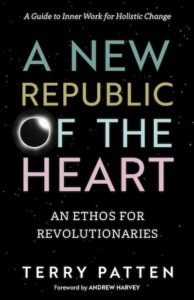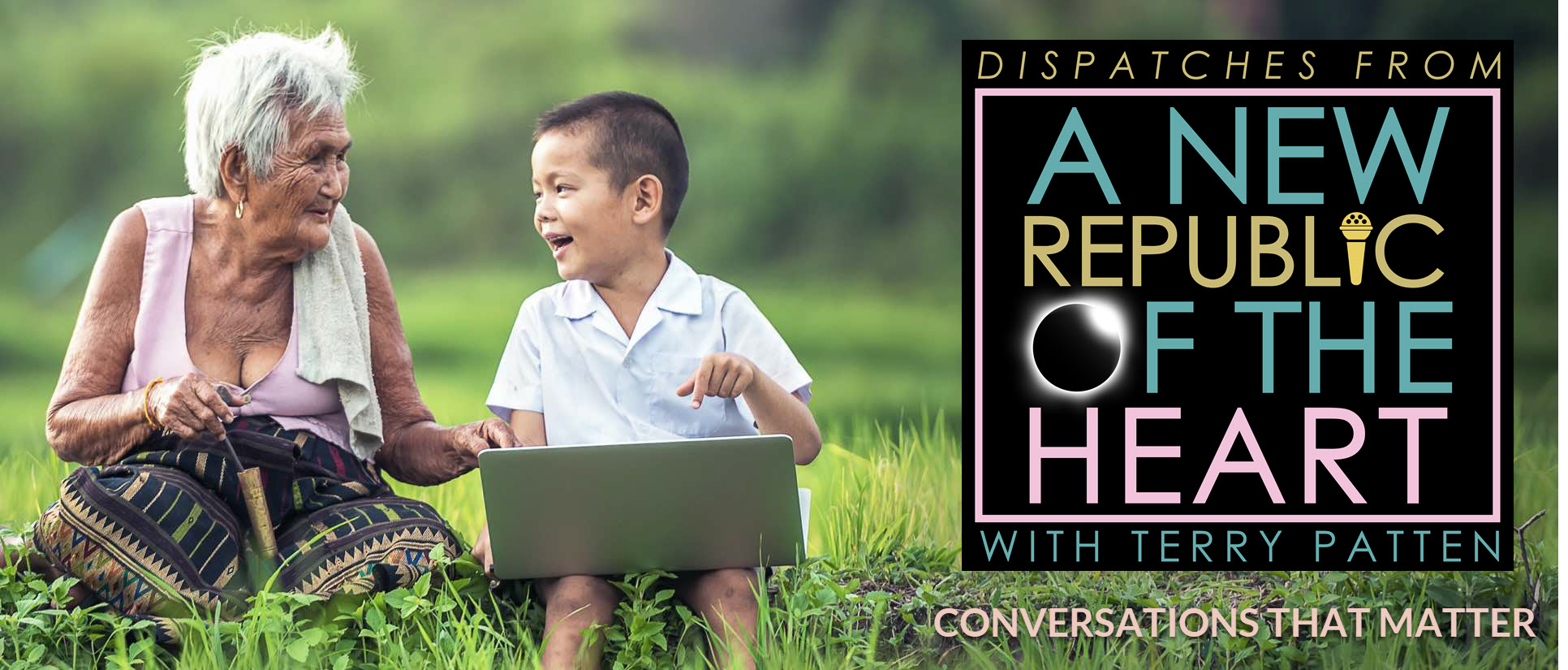Have a listen»
Posts in the Quote Series
0: Introduction: What’s Really Happening
2.1 Gratitude, Grief, Good and Evil
2.2 Activism - The Highest Calling of our Character
4.1 More Than Darwin's The Origin of Species
4.2 Bending the Arc of Evolution
5.1 The Integral Perspective: Altitudes and Attitudes
5.2 Understanding our Multidimensional Reality through the Four Quadrants
Setting the Context
Every responsible scientist agrees: our planet is on a trajectory towards uninhabitability. Author Terry Patten made the case, in Chapter 1, that humans have caused this predicament and that our society’s composition, and our own DNA, hinder our attempts to pull out of this nosedive. Yet he ends the chapter by asserting that our resilience and creativity can equip us to avert this catastrophe. How can he make such a claim, which flies in the face of all data collected so far? We are the Voices Blog team of the New Republic of the Heart community, and we will explore this question in a two part recital of our favorite excerpts from Terry Patten’s book, A New Republic of the Heart: An Ethos for Revolutionaries in Chapter 2, Translating Heartbreak into Action.Selected Readings From A New Republic of the Heart
Recitations by Anneke Edson, David Chasteen, Sallie Justice, Phil Justice, and Ed Prell
Chapter 2: Overview
(p. 11) Chapter 2 faces the sober facts, and responds with activism. Appreciating the gift of life, and loving life, we allow our hearts to be pierced by the maddening situation we find ourselves in; we consider how we can ground ourselves in an unconditional happiness that doesn’t depend on “reasons’ to be happy; and, finally, we consider the esoteric anatomy of activism–the absolutely complementary nature of inner and outer work.
Chapter 2: Translating Heartbreak into Action
(p. 45) No one can say with certainty how our civilizational crisis will play out. We don’t know how much suffering and destruction—human and nonhuman—might lie ahead, or how soon. But we do know, with increasing certainty, that the actions of human beings have created an existential predicament; and we also know that the actions of human beings—for good or for ill—will determine the future of our great grandchildren and most other living beings.
(p. 45 & 46) The stakes could scarcely be higher. We cannot wait to “see what happens” before we act on this awareness. Rather, we are obliged right now to do whatever we can to help prevent or mitigate the horrific scenarios that we may have set in motion. What could be a greater moral imperative?
(p. 46) The word “activist” conjures images of sit-ins, people circulating petitions and raising money and marching and organizing and meeting, and getting people to the polls. But it also means doing research, starting businesses, making loans, and changing one’s diet.
Gratitude, Grief, and Spiritual Activism
(p. 46) Spiritual life involves growing into a wise and healthy relationship to reality. The word “spiritual” points to the deepest level of being—essential and existential.
(p. 46) Spiritual growth and development enable us to glimpse the bountiful grace in which we live—the beauty of the world, and the privilege of conscious embodied existence. Gratitude is universal spiritual wisdom, and it is sufficient.
(p. 46) As Joanna Macy so sagely puts it, “If everyone I love is in danger, I want to be here, so I can do what I can.” Activism is simply acting on the impulse to “be of benefit” to something greater than yourself, in a whole variety of ways.
(p. 47) But exactly how can we effectively address the totality of this crisis? If addressing it requires knowing exactly how the crisis will unfold and exactly what it will take to prevent it, then we can’t.
(p. 47) As we have seen, no one, not even the best of scientists, has that degree of omniscience, especially with the kind of wicked predicament we are facing.
(p. 47) Paradoxically, the many little things we can do—each of which may seem in itself woefully insufficient to our total predicament—may well be a good start. We will continue to see the endings of life all around us, and we will grieve for all of the losses we witness.
(p. 47) Our spirit and consciousness will go through a transformative ordeal as we take in new terrible truths about our predicament. But many actions on many levels, when collectively engaged (and perhaps further catalyzed by positive black swan breakthroughs) may ultimately add up into a single great action.
(p. 47 & 48) The story of evolution is a story of miracle after miracle. We must simultaneously take in the magnitude of the problem–grieve for much inevitable suffering—and do what we can on behalf of creative solutions, on every scale.
(p. 48) To do both requires great openness on our part—openness to growth and to creative responses that we didn’t know were possible.
(p. 48) The first stage of the journey into spiritual activism is grounded robustly in gratitude and appreciation. In the second stage, we awaken from denial, apprehend the enormity of the challenge before us, and allow a great grieving process to transform the soul.
(p. 48) We benefit even from the awful moments of hopelessness—because despair is not just the end of our conventional hope. It is also the beginning point for a new possibility, a third stage—perhaps a kind of unreasonable affirmation.
The Wisdom of Grief
(p. 48) Not only is grieving a stage of the spiritual activist’s journey, but the grieving process itself often unfolds in stages, which can be described using Elizabeth Kubler-Ross’s famous five stages of grief. These five stages—denial, anger, bargaining, depression, and acceptance—describe the process of psychologically responding to the prospect and reality of any catastrophic loss.
(p. 48) Denial can be said to be a defense against suffering and grieving. If reality is too painful, don’t face it.
(p. 49) Anger easily becomes a habitual defense against feeling loss, sadness, and fear. There are very good reasons to be angry. Anger is the energy to change what needs to be changed. But healthy anger rises and falls, rather than becoming a chronic state, and it stays in touch with grief.
(p. 49) The next stage is bargaining, an attempt to regain lost equanimity, perhaps by imagining alternative scenarios that mitigate the sense of loss.
(p. 49) The fourth stage is depression. When it is clear that heartbreaking loss cannot be avoided, the being is at least temporarily shattered.
(p. 49) True acceptance recognizes the reality of our situation and accepts responsibility to arrive in basic equanimity and a capacity to act. We find a way to choose life, even in a world that includes horrific losses.
(p. 49) We choose engagement with reality, including the gritty and not always pleasant involvements with people we may not like and in situations we would prefer to avoid. We know we have arrived in acceptance when we are in motion, doing what we can to make a positive difference.
Grief as a Gateway
(p. 49) Grief is not weakness—it is a form of moral intelligence and even wisdom.
(p. 50) One of grief ’s great lessons is patience—an attitude of self-compassion.
(p. 50) Seeing an overwhelming army massed on the horizon was anciently seen as the test of a soldier’s mettle—it was the time to get strong, fierce, and inspired. The battle was coming. And in the meantime it was wonderful to be alive. The “meantime” is all any of us has ever had anyway.
Finding Your “Yes”
(p. 50 & 51) Activism emerges from the stark recognition that we really are the co-creators of our world. We wake up from the trance in which we had imagined ourselves to be passive observers of the world, standing somehow apart from it.
(p. 51) We recognize that we are not “in the stands” watching the action from an objective vantage point, and we never have been. We have always been on the field, and the ball is in play.
(p. 51) When we realize we are full participants, we awaken into activism, and our practice becomes to engage with the game completely, holding nothing back.
(p. 51) Human knowledge is far too incomplete to quantify our opportunities. The real bottom line is that even though the world may be seriously out of balance, we just don’t know—and can’t know—exactly how bad (and good) things really are.
(p. 51) But we don’t have to figure it all out. We don’t have to become tangled up in our unknowable future as if it were an unsolvable dilemma.
(p.52) Life wants to keep living. Insists on it, even. Evolution wants to keep evolving, and simply will not be refused. It comes forward with ancient, revolutionary fervor.
(p. 52) This impulse toward activism is the sound of love when it roars—when it demands to be heard.
The Hit is a Gift
(p. 53) Traumatic events can jolt and debilitate us. We can be traumatized not only by our personal experiences but also by political setbacks and shocks suffered by others in our network of care and concern..
(p. 53) The hit is intended to force you to react, and when reactive you are weakened. When you find your way entirely into the present moment, you discover that the hit has activated your whole being. It has awakened you, and it is a source of energy.
Good and Evil
(p. 54) My friends Michael Dowd and Connie Barlow use the word “evil” to mean “self-interest that pursues its own financial or pleasurable self-interest, knowing that in doing so it is harming the future or harming others or harming the body of life.”
(p. 54 & 55) It is critically important that we forge new ways of coming together with one another in the service of our larger health and wholeness.
(p. 55) That means creating a space for all people and creatures—and even wisely and compassionately accounting for those who lack empathy and compassion, including those we may perceive as evil and threatening.
(p. 55) It is my experience that there is a fundamental goodness, even some latent heroism, in almost every human heart. There is a willingness to go beyond narrow self-interest in a spirit of courage and generosity.


